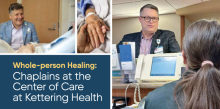Exceptional patient care begins with treating illness and injury, addressing the body’s intricate complexities. But it doesn’t end there. Truly exceptional care also recognizes and responds to the human spirit, affirming each person’s inherent dignity and worth—understanding humans as more than their biology.
Increasingly, research and experience affirm this holistic approach as healthcare moves toward values-based models. Yet, this philosophy is not new. Seventh-day Adventist healthcare has long embraced this view, seeing every patient as an image-bearer of God.
While evident throughout healthcare settings, this commitment to whole-person care is particularly crucial in acute settings, where life’s vulnerability is clear, and where no role at Kettering Health more uniquely embodies this belief than that of the hospital chaplain.
A Vital Part of the Team
“The role of the chaplain at Kettering Health today is one of a spiritual care provider,” says Garth Adams, chaplain at Kettering Health Dayton. Whether it’s care for the patients or staff, chaplains are trained to navigate—with presence and clarity—the often-overlooked yet deeply human aspects in health and healing like grief, suffering, purpose, and meaning. “The chaplain also provides guidance and support for how one can nurture and restore the often-neglected spiritual areas of our life, which might adversely affect our health.”
Adams emphasizes this isn’t a recent development. “Fortunately, chaplains have never been seen as ornamental within Kettering Health. Beginning with employee orientation, chaplains are introduced as an essential member of the care team.”
Expanding Care Among Crisis
Over the past decade, chaplains have become essential to patient and employee care—a role notably amplified during the COVID-19 pandemic.
“During the pandemic, no outside clergy could visit,” says Raul Concha, chaplain at Kettering Health Miamisburg. “We became the sole spiritual connection for patients, especially early on when families were restricted. Our role expanded significantly.”
As distancing protocols limited direct patient interaction, chaplains intensified their focus on staff, recognizing employees as crucial conduits of patient care. “We intentionally rounded on all units, offering emotional support, prayer, and personal conversations,” notes Concha.
This strategic shift has continued post-pandemic, amplifying the chaplain’s impact through hospital staff. “We can’t reach every patient individually,” explains Elliot Smith, chaplain at Kettering Health Main Campus. “But supporting staff means indirectly reaching many more.” Smith emphasizes, “Helping staff care for themselves emotionally and spiritually ultimately leads to better patient care.”
Where Medicine Meets Meaning
Chaplains are also increasingly present during complex care decisions.
“Our doctors, nurses, and administrators have welcomed chaplains as vital contributors in moments that requirenmore than medical expertise,” says Kevin Walter Gill, chaplain at Kettering Health Troy. “These moments are often less about clinical facts and more about meaning, morality, grief, fear, and spiritual conviction. Chaplains are uniquely equipped to walk with patients and families across the delicate lines of belief, ethics, and emotional need.”
Gill adds, “Regular participation in interdisciplinary rounds, collaboration through consults, teaching sessions for medical residents on spirituality in medicine—these are no longer exceptions, but growing norms at Kettering Health.”
Multiplying the Mission
Looking ahead, Jimmy Mann, chaplain at Kettering Health Dayton, says, “The next chapter is clear. From our Lord and King, we have been called to occupy until He comes—which means show forth the Great Commission into the world, showing forth the love and mercy of Christ Jesus.”
Mann adds, “The chaplain offers the peace of God, which surpasses all human understanding, during the most vulnerable moments for patients, families, and staff. The chaplain’s hope is totally dependent on the supremacy and sovereignty of Yahweh.”
For patients, that impact can be unforgettable.
As Raul Concha recalls, one patient, after a long ICU stay, shared that his impact made it clear to the patient where his influence came from:
“He said to me that ‘I could not have made it without your support and prayers. I’m so glad we met here. You were an angel sent from heaven to me.’”

